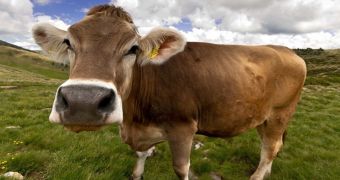In this day and age, good old carbon dioxide is the poster child for global warming and climate change. Consequently, there are many who keep badmouthing it and who would love nothing more than rid our planet of it.
However, there is one other very potent greenhouse gas – way more potent than carbon dioxide – that we should be worrying about, but that, for some reason, does not make it on the news all that often.
This gas is methane, scientists explain. Unlike carbon dioxide, it does not linger on in our planet's atmosphere for long. However, while there, it is a major contributor to both climate change and global warming.
Presently, researchers are trying to figure out how and why methane works its way into Earth's atmosphere. This is because, once the sources are identified, limiting methane emissions should be a fairly easy thing to do.
Interestingly enough, a recent paper in the Journal of Geophysical Research: Atmospheres says that, as surprising as this may sound, livestock is to blame for a significant amount of the methane floating about over our heads.
Specifically, it appears that, back in 2004, livestock in the United States released more methane than the oil and gas industry combined did. Interestingly enough, researchers say these emissions were downplayed by the country's government.
Thus, scientists say that, all things considered, the actual amount of methane that livestock in the United States emitted in 2004 was considerably higher than what the country's Environmental Protection Agency told people.
As detailed by Phys Org, information obtained with the help of satellites indicates that, over the summer of 2004, livestock in said country produced approximately 13 million tons of methane. The Agency, however, reported just 9.7 million tons.
What's interesting is that, by the looks of it, methane emissions for which the oil and gas industry was to blame were not properly reported either. On the contrary, scientists claim the Environmental Protection Agency upped the figure from 7 million tons to 9.9 million tons.
This report follows a study published in the journal Proceedings of the National Academy of Sciences late last year, which said that, when compared to sheep, pigs, and poultry, cattle were by far the top greenhouse gas emitters.
Specifically, the study in question argued that cattle worldwide must be held accountable for about 77% of the global greenhouse gas emissions linked to livestock. This is because, when digesting their food, these animals produce harmful compounds that they later release by burping or passing gas.

 14 DAY TRIAL //
14 DAY TRIAL //